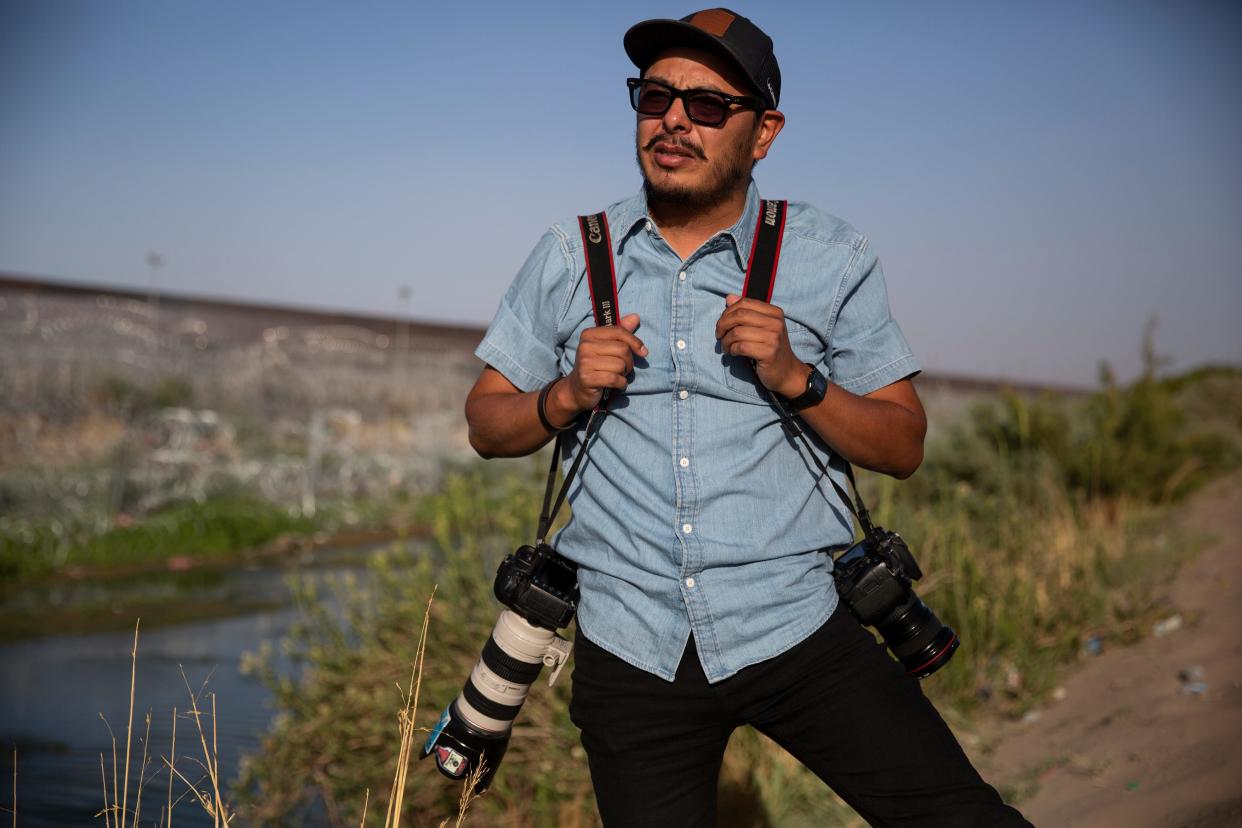Christian Torres Chavez's Pulitzer prize: A win for 'Juárez journalism'

Christian Torres Chavez had spent days on the U.S.-Mexico border in late March 2023. He was hired by the Associated Press as a freelance photographer to cover a large group of migrants making their journey to cross the Rio Grande into the United States from Ciudad Juárez, Mexico.
Like his grandfather and father, Torres was drawn to photojournalism. He developed his style and learned "that working as a freelancer on the border is difficult, you always have to be hungry for work."
A photo Torres captured on March 29, 2023, was part of an AP entry that last week won the 2024 Pulitzer Prize in Feature Photography.
El Paso Times photojournalist Omar Ornelas spent some time with Torres, talking about his experience and trajectory in photojournalism. Torres says receiving the top prize in journalism recognizes "the good photographers, good reporters, good videographers" working and living on the border.
"I feel very proud that AP kept me in mind and lifted up, I guess you could say, Juárez journalism," Torres said.
Here is a Q&A with Torres about his prestigious recognition:
El Paso Times: Christian, tell me a little about how you became a photojournalist.
Torres: I had lived with cameras since I was a child. When I was a kid, my dad would pick me up from school and so sometimes I accompanied him in his work as a photojournalist. It didn’t interest me though. Even my family would sometimes ask me, ‘Are you going to be a photographer like your grandfather and your dad?’ But it didn’t interest me. I was studying medicine at the Universidad Autónoma de Ciudad Juárez, but I left school after two semesters. Then my dad invited me to go practice at the newspaper El Diario de Juárez, and I accepted. I started to like the day-to-day life of a photojournalist. I learned a lot from my colleagues then. When I started, I was 17 years old, so they officially hired me when I turned 18. Now I have about 14 years of experience. From a very young age, I’ve had to cover very difficult situations. The violence, the women, the disappeared. And now the phenomenon of migration.
El Paso Times: Let’s talk specifically about this photo that was included as part of the presentation by AP. What do you remember about this image and that day?
Torres: Days before, the fire had happened at the Instituto Nacional de Migración, where migrants were burned to death. So the migrants began to make a camp in front of the building. A rumor started that the United States would open the border to receive them because of the deaths in the fire. About 1,500-2,000 migrants began to walk toward the border to get into the United States. We had been covering the aftermath of the fire, arriving at 8 in the morning until 10 or 11 at night. We were there for several days. I had blisters on my feet and we walked with the migrants from the Instituto de Migración to the point where they crossed, to achieve this objective of documenting the crossing, because it was something new for them to cross the Rio Grande in such large groups. That’s why I felt that it was an important story and even more so because of the fire. There were photographers there from many parts of the world. So for me it was very important that AP had kept me in mind, because at that time they had sent a staff team from Mexico City. And that’s what I was talking about before, that working as a freelancer on the border is difficult, you always have to be hungry for work. And I thought, ‘That’s it, they’re not going to require my work now.’ But the editor told me to keep working. I had blistered feet and we walked for kilometers and kilometers, and then it happened. The migrants began to cross. This was one of those pictures. I didn’t think it would have so much impact. But truly, I feel very proud that AP kept me in mind and lifted up, I guess you could say, Juárez journalism. That the whole world can turn to look at us, that we can raise our hand and say ‘Here we are!’ Here we have good photographers, good reporters, good videographers. So I feel that it can help, in the future, that they turn to look at all of us here.
El Paso Times: What happened on the day that you found out you were part of the team that won a Pulitzer?
Torres: I was working. An editor sent me a message, ‘Hey, I’m sending you a link for the Pulitzer event, check it out because some of your work is there.’ I thought, ‘Oh, wow,’ and I felt sort of a premonition. And then another editor called and said, ‘Congratulations, we were winners, you and your colleagues, we won the Pulitzer.’ I thought, ‘You’re kidding, it can’t be true.’ I couldn’t believe it. Even now, I haven’t been able to absorb the news. I see myself on television, I see what everyone is saying, and still I can’t believe it. On that day, I was on an assignment with the governor, and the whole time I was crying and crying, with all the messages of support people were sending me. It was an amazing experience.
El Paso Times: Is there anything you’d like to add?
Torres: I want to express my gratitude to my colleagues, friends, to my dad and my grandfather. If it weren’t for them, I wouldn’t be here. I would be doing something else, an office job maybe. So above all, that, and gratitude to my family and my sons, Elliot and Dael.
This article originally appeared on El Paso Times: Christian Torres Chavez's Pulitzer prize: A win for 'Juárez journalism'

